Mark David Gerson's Blog, page 22
February 9, 2011
You Can Be a Part of Motion Picture History!
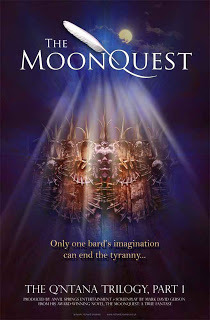 If you're a fan of The MoonQuest book or of visionary fantasy of any sort, you can play an active and important part in getting this award-wining story onto the big screen.
If you're a fan of The MoonQuest book or of visionary fantasy of any sort, you can play an active and important part in getting this award-wining story onto the big screen.You see, the film trailers we're shooting in March are designed to attract investors to a multimillion-dollar MoonQuest feature. And while our high-caliber professional cast and crew on the trailer have all volunteered their talents, and we've had other critical services donated, there are requirements we can't get for free, such location permits and prop/set/wardrobe odds 'n ends.
That's why we've launched a modest trailer fundraising campaign on IndieGoGo. And that's why I'm urging you to contribute (as little as $1!) to help get the trailer made. It's also why I'm encouraging you to spread the word about our project to friends and family and through any social networks you're part of. (If you've already donated, thank you!!)
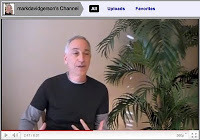 Then, when this professionally produced trailer gets us the funding that makes the feature possible and The MoonQuest movie hits your neighborhood movie theater, you can say you were a part of getting it there!!
Then, when this professionally produced trailer gets us the funding that makes the feature possible and The MoonQuest movie hits your neighborhood movie theater, you can say you were a part of getting it there!!By the way, The MoonQuest is only Part I of the three-part Q'ntana Trilogy. The StarQuest and The SunQuest (movies and books) are already in the works!
Please check out our campaign page and video on Indie GoGo and be part of The MoonQuest Dream! And watch that site for our official cast announcement.
• Poster design for The MoonQuest Movie (and its two sequels) donated by professional graphic artist Richard Crookes, who also designed the cover for The Voice of the Muse: Answering the Call to Write.
Published on February 09, 2011 09:44
February 5, 2011
Trust Unlimited
 "You either trust or you do not," M'nor [the moon] stated. "There is no halfway in between."
"You either trust or you do not," M'nor [the moon] stated. "There is no halfway in between."~ The MoonQuest: A True Fantasy
That line, originally from The MoonQuest book and now also part of The MoonQuest screenplay, is both my most loved and hated one in the story. I love it and hate it for the same reason: It is one of the deepest truths I know and, after having lived many years of not trusting much of anything, profound and unconditional trust is the only way I now know to live my life...and, sometimes, the scariest.
Trust in what? In both The MoonQuest and my life, it's trust in that wiser, infinite power that's greater than what we know to be the human mind and body in its physical form. It's trust in an inner knowingness that, although innate, must still be awakened, fostered, nurtured and cultivated. Whether you call it God, Buddha, Allah, Infinite Source, Higher Self, Muse or the voice of your heart, we can all access it, because it lies within each of us -- a soul potential waiting to be sparked into passionate expression.
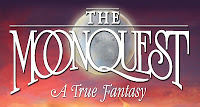 In The MoonQuest, that intuitive power is all that the main character has to guide him on his journey to bring storytelling back to a silenced land and light back to a darkened moon.
In The MoonQuest, that intuitive power is all that the main character has to guide him on his journey to bring storytelling back to a silenced land and light back to a darkened moon.It's no different in life. Whatever rules, structures, systems, ruts and routines we're encouraged to adhere to -- by parents, education, culture, media or fear -- the right path is always the one that, in the end, can rely only on what we know in our hearts to be true.
"I am Tikkan Dreamwalker," Na'an said. "I speak only what you know in your heart to be true."It's also no different in writing, or in any creative pursuit. There can be no hard-and-fast rules in art...or it's not art. It's a poor imitation of someone else's innovation.
"Ride north one league at a time," O'ric tells Toshar as the young man embarks on his MoonQuest. "The North Star will guide you at night. A path between the suns will guide you in the day. Your heart will guide you always."
Our hearts do guide us always...when we're open enough to listen, still enough to hear and trusting enough to follow its path.
In the moment of choice, though, trust is rarely the most comfortable option. Often, it's downright terrifying because it seems to make no conventional sense. In the past, that terror paralyzed me, held me back from the hard choices...the trusting choices.
"You do not trust," M'nor said. Disappointment shaded her voice. "You must either trust or abandon the quest. The choice is yours."Had Toshar relied on a "common sense" that ignores the non-physical senses and on a "conventional" wisdom that is so rarely wise, he would never have completed the MoonQuest. Had I relied on those limited and limiting tools, there would have been no Toshar, nor would I now be engaged in one of the most exciting endeavors of my life so far: getting The MoonQuest onto the big screen.
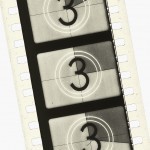 Nothing about this film project makes any sense. Yet, here I am. Nothing about my life right now makes any sense. Yet, here I am. As difficult and frightening as the choice for non-sense can be, trusting enough to make that choice has always proven to be the most satisfying, gratifying and rewarding path for me. And so that is the path I continue to take.
Nothing about this film project makes any sense. Yet, here I am. Nothing about my life right now makes any sense. Yet, here I am. As difficult and frightening as the choice for non-sense can be, trusting enough to make that choice has always proven to be the most satisfying, gratifying and rewarding path for me. And so that is the path I continue to take.You can't half trust any more than you can be half pregnant. You either trust or you do not. Truly, there is no halfway in between.
All quotes from The MoonQuest, book or screenplay (c) 2008, 2010 Mark David Gerson. All rights reserved.
Published on February 05, 2011 21:10
February 3, 2011
Only Connect
A Guest Post by Erik Bork
 The single most devastating note I could ever hear on one of my scripts (if readers were brutally honest enough to say it), would be, "I didn't care." I would go as far as to say that my single biggest job as a writer is to make readers and audiences care: to get them emotionally invested enough in what's happening in a story to want to keep reading or watching. What this really means is they must care about the character at the center of it – to deeply relate to what they're going through on a human level, and want to see them solve whatever big problem the story is exploring.
The single most devastating note I could ever hear on one of my scripts (if readers were brutally honest enough to say it), would be, "I didn't care." I would go as far as to say that my single biggest job as a writer is to make readers and audiences care: to get them emotionally invested enough in what's happening in a story to want to keep reading or watching. What this really means is they must care about the character at the center of it – to deeply relate to what they're going through on a human level, and want to see them solve whatever big problem the story is exploring.
The title of the book Save The Cat! comes from Blake Snyder's admonition that the "hero" of a story must "save a cat," – or do something similarly sympathetic – in the first ten pages of a screenplay, so that readers will think this person is worthy of their attention and time. While I agree with that, I would go further: I believe we need to get the reader inside the main character's perspective on things – inside their skin, almost – so that it feels like what's happening to that character is happening to them, throughout the story.
comes from Blake Snyder's admonition that the "hero" of a story must "save a cat," – or do something similarly sympathetic – in the first ten pages of a screenplay, so that readers will think this person is worthy of their attention and time. While I agree with that, I would go further: I believe we need to get the reader inside the main character's perspective on things – inside their skin, almost – so that it feels like what's happening to that character is happening to them, throughout the story.
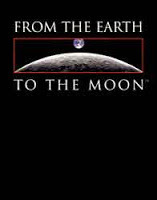 The first script I wrote professionally was an episode of the HBO miniseries From the Earth to the Moon
The first script I wrote professionally was an episode of the HBO miniseries From the Earth to the Moon . The one I chose focused on an individual astronaut with a problem, which seemed like it would keep him from ever flying in the Apollo program. I identified this situation as having good story potential, in comparison to some of the other episodes, which focused on missions which did not necessarily have such a likely potential main character who audiences might get invested in. So far, so good.
. The one I chose focused on an individual astronaut with a problem, which seemed like it would keep him from ever flying in the Apollo program. I identified this situation as having good story potential, in comparison to some of the other episodes, which focused on missions which did not necessarily have such a likely potential main character who audiences might get invested in. So far, so good.
But when I wrote the first drafts of the script, I got so caught up in the research, and the responsibility of accurately documenting all the key events of the Apollo mission this episode was focused on, that when I gave the script to another professional screenwriter who was involved in the project, he clearly didn't care about the story. He was nice enough not to put it that way. What he said was that he thought it needed more of a clear point-of-view.
What that meant was not just that this character needed to be at the center of events – he already was. But the audience needed to experience what he thought, felt and wanted from inside his perspective more. It had to become an emotional journey for them. It's not enough for them to be somewhat interested in his situation, and the mission he ended up flying on. The real goal is for them to care – to relate to this human being and really want him to achieve the goal this story was focused on.
How does one achieve that? Well, the first point I would make might seem an obvious, but also stifling rule: they should be in virtually every scene. I remember how much I chafed against this idea when my college screenwriting professor first offered it, and how I sought out movie examples with main characters that weren't in many of the scenes, in order to try to prove him wrong. (I don't remember how far I got with that, but I don't think I was a big success.) Of course, you don't need to be slavish about this, but you might be surprised if you looked at successful movies you have loved, to discover just how many scenes the main character is present in. I would wager that they're in the vast majority of scenes – and in the ones they're not, there's a very clear and important story reason (which probably has a lot to do with them, even though they're not physically present).
But it's not just that they're present. Usually, they should be driving the action of the scene: what they want and are trying to do should be the main thing each scene is about. And it takes all the scenes of a movie for them to finally achieve their goal. That's how hard and complicated the problem is.
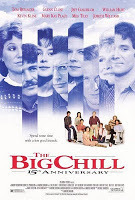 Of course, there are stories which have more than one "main character," but I think they're rarer than you might think. A true "ensemble" movie is one in which multiple characters each have their own mini-stories that interweave, as in Crash
Of course, there are stories which have more than one "main character," but I think they're rarer than you might think. A true "ensemble" movie is one in which multiple characters each have their own mini-stories that interweave, as in Crash , The Big Chill
, The Big Chill or He's Just Not That Into You
or He's Just Not That Into You . But you'll notice that even in these movies, in any particular scene, we are squarely within the emotional perspective of the "main character" of that storyline. In other words, things aren't told "objectively," from above.
. But you'll notice that even in these movies, in any particular scene, we are squarely within the emotional perspective of the "main character" of that storyline. In other words, things aren't told "objectively," from above.
In many scripts that I read, that's exactly what it feels like: we're looking down on events, and not experiencing them emotionally from inside the main character. We may not even be fully aware of what the main character is thinking, feeling, wanting, or trying to achieve. Or there might not be a clear main character – just a bunch of characters experiencing a story, none of whom we are really inside of.
I recently contributed a "beat sheet" for the Save the Cat website, analyzing The Kids Are All Right . In writing it I discovered that this movie had no one main character, but actually explored all five of the central characters' points of view on the story they're all involved in. This is another kind of "ensemble" approach that is rarely used, but can be effective if done right. But again, in every single scene, we're really focused on a particular character's emotions as they are experiencing what's going on. We're made to feel, intimately, what it's like to be each of these characters.
. In writing it I discovered that this movie had no one main character, but actually explored all five of the central characters' points of view on the story they're all involved in. This is another kind of "ensemble" approach that is rarely used, but can be effective if done right. But again, in every single scene, we're really focused on a particular character's emotions as they are experiencing what's going on. We're made to feel, intimately, what it's like to be each of these characters.
 I believe emotional connection and resonance is what storytelling is all about (along with entertaining – if we want to find an audience). The best way to achieve this is to give your main character a big, difficult, complicated, important problem with huge stakes for them – which challenges them to go on a "mission" that will take the whole movie to solve. And then, to dramatize that mission from their perspective – to be with them as they attempt to achieve their goals, as they fail, change plans, run up against unintended consequences, and get pressed to their limit, before things finally get resolved. In other words, to get us so invested in their point-of-view, that it becomes our own.
I believe emotional connection and resonance is what storytelling is all about (along with entertaining – if we want to find an audience). The best way to achieve this is to give your main character a big, difficult, complicated, important problem with huge stakes for them – which challenges them to go on a "mission" that will take the whole movie to solve. And then, to dramatize that mission from their perspective – to be with them as they attempt to achieve their goals, as they fail, change plans, run up against unintended consequences, and get pressed to their limit, before things finally get resolved. In other words, to get us so invested in their point-of-view, that it becomes our own.
ERIK BORK is best known for his Emmy-winning work as a writer-producer on HBO's miniseries Band of Brothers and From the Earth to the Moon. He has sold pitches, written pilots and worked on staff of primetime drama series, and written screenplays on assignment for Universal Pictures, HBO and others. He also was recently rated "Cream of the Crop" in Creative Screenwriting's "The Best Script Analysts and Consultants." Contact him through his website at flyingwrestler.com, where this article first appeared.
and From the Earth to the Moon. He has sold pitches, written pilots and worked on staff of primetime drama series, and written screenplays on assignment for Universal Pictures, HBO and others. He also was recently rated "Cream of the Crop" in Creative Screenwriting's "The Best Script Analysts and Consultants." Contact him through his website at flyingwrestler.com, where this article first appeared.
 The single most devastating note I could ever hear on one of my scripts (if readers were brutally honest enough to say it), would be, "I didn't care." I would go as far as to say that my single biggest job as a writer is to make readers and audiences care: to get them emotionally invested enough in what's happening in a story to want to keep reading or watching. What this really means is they must care about the character at the center of it – to deeply relate to what they're going through on a human level, and want to see them solve whatever big problem the story is exploring.
The single most devastating note I could ever hear on one of my scripts (if readers were brutally honest enough to say it), would be, "I didn't care." I would go as far as to say that my single biggest job as a writer is to make readers and audiences care: to get them emotionally invested enough in what's happening in a story to want to keep reading or watching. What this really means is they must care about the character at the center of it – to deeply relate to what they're going through on a human level, and want to see them solve whatever big problem the story is exploring.The title of the book Save The Cat!
 comes from Blake Snyder's admonition that the "hero" of a story must "save a cat," – or do something similarly sympathetic – in the first ten pages of a screenplay, so that readers will think this person is worthy of their attention and time. While I agree with that, I would go further: I believe we need to get the reader inside the main character's perspective on things – inside their skin, almost – so that it feels like what's happening to that character is happening to them, throughout the story.
comes from Blake Snyder's admonition that the "hero" of a story must "save a cat," – or do something similarly sympathetic – in the first ten pages of a screenplay, so that readers will think this person is worthy of their attention and time. While I agree with that, I would go further: I believe we need to get the reader inside the main character's perspective on things – inside their skin, almost – so that it feels like what's happening to that character is happening to them, throughout the story. The first script I wrote professionally was an episode of the HBO miniseries From the Earth to the Moon
The first script I wrote professionally was an episode of the HBO miniseries From the Earth to the Moon . The one I chose focused on an individual astronaut with a problem, which seemed like it would keep him from ever flying in the Apollo program. I identified this situation as having good story potential, in comparison to some of the other episodes, which focused on missions which did not necessarily have such a likely potential main character who audiences might get invested in. So far, so good.
. The one I chose focused on an individual astronaut with a problem, which seemed like it would keep him from ever flying in the Apollo program. I identified this situation as having good story potential, in comparison to some of the other episodes, which focused on missions which did not necessarily have such a likely potential main character who audiences might get invested in. So far, so good.But when I wrote the first drafts of the script, I got so caught up in the research, and the responsibility of accurately documenting all the key events of the Apollo mission this episode was focused on, that when I gave the script to another professional screenwriter who was involved in the project, he clearly didn't care about the story. He was nice enough not to put it that way. What he said was that he thought it needed more of a clear point-of-view.
What that meant was not just that this character needed to be at the center of events – he already was. But the audience needed to experience what he thought, felt and wanted from inside his perspective more. It had to become an emotional journey for them. It's not enough for them to be somewhat interested in his situation, and the mission he ended up flying on. The real goal is for them to care – to relate to this human being and really want him to achieve the goal this story was focused on.
How does one achieve that? Well, the first point I would make might seem an obvious, but also stifling rule: they should be in virtually every scene. I remember how much I chafed against this idea when my college screenwriting professor first offered it, and how I sought out movie examples with main characters that weren't in many of the scenes, in order to try to prove him wrong. (I don't remember how far I got with that, but I don't think I was a big success.) Of course, you don't need to be slavish about this, but you might be surprised if you looked at successful movies you have loved, to discover just how many scenes the main character is present in. I would wager that they're in the vast majority of scenes – and in the ones they're not, there's a very clear and important story reason (which probably has a lot to do with them, even though they're not physically present).
But it's not just that they're present. Usually, they should be driving the action of the scene: what they want and are trying to do should be the main thing each scene is about. And it takes all the scenes of a movie for them to finally achieve their goal. That's how hard and complicated the problem is.
 Of course, there are stories which have more than one "main character," but I think they're rarer than you might think. A true "ensemble" movie is one in which multiple characters each have their own mini-stories that interweave, as in Crash
Of course, there are stories which have more than one "main character," but I think they're rarer than you might think. A true "ensemble" movie is one in which multiple characters each have their own mini-stories that interweave, as in Crash , The Big Chill
, The Big Chill or He's Just Not That Into You
or He's Just Not That Into You . But you'll notice that even in these movies, in any particular scene, we are squarely within the emotional perspective of the "main character" of that storyline. In other words, things aren't told "objectively," from above.
. But you'll notice that even in these movies, in any particular scene, we are squarely within the emotional perspective of the "main character" of that storyline. In other words, things aren't told "objectively," from above.In many scripts that I read, that's exactly what it feels like: we're looking down on events, and not experiencing them emotionally from inside the main character. We may not even be fully aware of what the main character is thinking, feeling, wanting, or trying to achieve. Or there might not be a clear main character – just a bunch of characters experiencing a story, none of whom we are really inside of.
I recently contributed a "beat sheet" for the Save the Cat website, analyzing The Kids Are All Right
 . In writing it I discovered that this movie had no one main character, but actually explored all five of the central characters' points of view on the story they're all involved in. This is another kind of "ensemble" approach that is rarely used, but can be effective if done right. But again, in every single scene, we're really focused on a particular character's emotions as they are experiencing what's going on. We're made to feel, intimately, what it's like to be each of these characters.
. In writing it I discovered that this movie had no one main character, but actually explored all five of the central characters' points of view on the story they're all involved in. This is another kind of "ensemble" approach that is rarely used, but can be effective if done right. But again, in every single scene, we're really focused on a particular character's emotions as they are experiencing what's going on. We're made to feel, intimately, what it's like to be each of these characters. I believe emotional connection and resonance is what storytelling is all about (along with entertaining – if we want to find an audience). The best way to achieve this is to give your main character a big, difficult, complicated, important problem with huge stakes for them – which challenges them to go on a "mission" that will take the whole movie to solve. And then, to dramatize that mission from their perspective – to be with them as they attempt to achieve their goals, as they fail, change plans, run up against unintended consequences, and get pressed to their limit, before things finally get resolved. In other words, to get us so invested in their point-of-view, that it becomes our own.
I believe emotional connection and resonance is what storytelling is all about (along with entertaining – if we want to find an audience). The best way to achieve this is to give your main character a big, difficult, complicated, important problem with huge stakes for them – which challenges them to go on a "mission" that will take the whole movie to solve. And then, to dramatize that mission from their perspective – to be with them as they attempt to achieve their goals, as they fail, change plans, run up against unintended consequences, and get pressed to their limit, before things finally get resolved. In other words, to get us so invested in their point-of-view, that it becomes our own.ERIK BORK is best known for his Emmy-winning work as a writer-producer on HBO's miniseries Band of Brothers
 and From the Earth to the Moon. He has sold pitches, written pilots and worked on staff of primetime drama series, and written screenplays on assignment for Universal Pictures, HBO and others. He also was recently rated "Cream of the Crop" in Creative Screenwriting's "The Best Script Analysts and Consultants." Contact him through his website at flyingwrestler.com, where this article first appeared.
and From the Earth to the Moon. He has sold pitches, written pilots and worked on staff of primetime drama series, and written screenplays on assignment for Universal Pictures, HBO and others. He also was recently rated "Cream of the Crop" in Creative Screenwriting's "The Best Script Analysts and Consultants." Contact him through his website at flyingwrestler.com, where this article first appeared.
Published on February 03, 2011 20:33
February 2, 2011
Feeling Rejected? Don't Be Dejected!
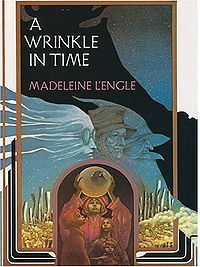 I didn't discover Madeleine L'Engle's A Wrinkle in Time
I didn't discover Madeleine L'Engle's A Wrinkle in Time until I was an adult in the early years of my spiritual awakening. It's a gem of a book, filled -- as is all her writing -- with spiritual truths for young adults and adults alike. Today, nearly two decades after that first reading, the profound wisdom of this prolific author and devout Episcopalian continues to inspire me.
until I was an adult in the early years of my spiritual awakening. It's a gem of a book, filled -- as is all her writing -- with spiritual truths for young adults and adults alike. Today, nearly two decades after that first reading, the profound wisdom of this prolific author and devout Episcopalian continues to inspire me. One of my favorite L'Engle stories, apart from the one that follows, comes from one of her nonfiction books -- I don't now remember which. In it she describes legions of white-bearded Old Testament prophets, their faces raised to the sky, shouting up at God, incredulously: "You want me to do what!?" There are days I know just how they felt!
I first posted a version of this piece about rejection in June 2008. But I get so many requests for it, that I've decided to make it new again by reposting it.
Feeling rejected? When you read L'Engle's story, I guarantee you won't be dejected!
 Author Madeleine L'Engle received two years' worth of rejections from 26 publishers for her novel A Wrinkle in Time
Author Madeleine L'Engle received two years' worth of rejections from 26 publishers for her novel A Wrinkle in Time , which, once it was finally published in 1962, went on to win major awards and be translated into more than a dozen languages.
, which, once it was finally published in 1962, went on to win major awards and be translated into more than a dozen languages.Toward the end of that two-year period, L'Engle covered up her typewriter and decided to give up -- on A Wrinkle in Time and on writing. Then on her way downstairs, a revelation: an idea for a novel about failure. In a flash, she was back at the typewriter.
"That night," as she explained in April 1993 on the PBS documentary Madeleine L'Engle: Stargazer, "I wrote in my journal, 'I'm a writer. That's who I am. That's what I am. That's what I have to do -- even if I'm never, ever published again.' And I had to take seriously the fact that I might never, ever be published again. ... It's easy to say I'm a writer now, but I said it when it was hard to say. And I meant it."
Today, the bibliography on L'Engle's web site lists 62 works spanning the period from 1944 through 2005, plus a 63rd, published posthumously in 2008. Sadly, Madeleine L'Engle died in September 2007.
"I cannot possibly tell you how I came to write A Wrinkle in Time," her New York Times obituary quotes her as having said. "It was simply a book I had to write. I had no choice."
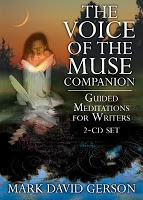 Whether you're published or not, if you're writing, you are a writer.
Whether you're published or not, if you're writing, you are a writer. Need some help believing that? watch the video meditation, "You Are A Writer." The audio was drawn from The Voice of the Muse Companion: Guided Meditations for Writers.
Published on February 02, 2011 11:55
January 26, 2011
Making The MoonQuest Movie a Reality
"In a land where fear rules and storytelling spells death, only one bard's imagination can end the tyranny."
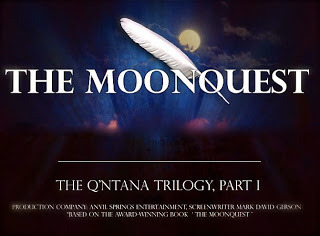 If you've been following this blog, you know that I've long seen my visionary fantasy novel, The MoonQuest, as a movie. You probably also know that, through Anvil Springs Entertainment, that dream is on its way to becoming a reality.
If you've been following this blog, you know that I've long seen my visionary fantasy novel, The MoonQuest, as a movie. You probably also know that, through Anvil Springs Entertainment, that dream is on its way to becoming a reality.To help accelerate that process, I'm now working with Anvil Springs to produce three short trailers -- one for The MoonQuest and one for each of its two sequels, The StarQuest and The SunQuest. Together the three stories (book and film) make up The Q'ntana Trilogy.
The trailers will be presented to investors in the coming months to inspire them to invest in a feature-film version of The MoonQuest, the first of the trilogy to be produced.
So far, for the trailers, we've assembled a stellar cast of actors, a dedicated crew and a committed production and postproduction staff. Most are local to New Mexico, but some are planning to travel to Albuquerque from Los Angeles next month for the film shoot. One of the many miracles surrounding this project is that everyone involved is not only a professional but a volunteer who believes passionately in the project. They're volunteering because our starting budget for these trailers was $0.
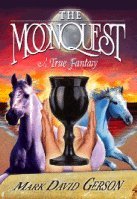 By the way, miracles have surrounded this project almost since the day the book came out.
By the way, miracles have surrounded this project almost since the day the book came out. It was at one of my very first book-signings, in an Albuquerque Borders Books & Music, that I met Kathleen Messmer, who had just created Anvil Springs and was on the lookout for new projects. She loved both the book (which hadn't yet won its multiple awards) and my screenplay adaptation, and the rest is history.
Well, almost...
Although we began trailer production on a zero budget, we've come to realize that there are some expenses we just can't avoid incurring, not least because New Mexico isn't the best resource for the medieval-style costumes, props and settings required for this type of fantasy.
That's where you come in.
Today, we launched a fundraising campaign on Indie GoGo, the web's premier platform for the grassroots financing of independent creative projects. With your help, we can raise not only our $3,000 Indie GoGo goal for The MoonQuest trailer, but an additional $2,000 to make sure that the StarQuest and SunQuest trailers are also filmed -- and that all three are of the superlative quality that will propel their respective features to the big screen.
To thank you for your contributions, we're offering a series of gifts, ranging from a public thank you to a day on set during the filming of the trailer. In between, there are opportunities to get MoonQuest merchandise, a studio-photographed headshot, an hour's creativity or life coaching from me...and more.
A few hours ago, one of my Facebook friends posted this on my wall:
"I don't know anyone who is living their dream more than you."I feel incredibly blessed to find myself in that place. With your help, I can take that dream to its next level -- not only for myself but for all those who will be touched by the life-affirming message of the Q'ntana stories.
 Please share news about our Indie GoGo campaign and our project wherever you can -- on Facebook, MySpace and Twitter, on blogs and to your friends. The more people who know about the campaign and the project it's supporting, the sooner you'll see The MoonQuest in a movie theatre near you!
Please share news about our Indie GoGo campaign and our project wherever you can -- on Facebook, MySpace and Twitter, on blogs and to your friends. The more people who know about the campaign and the project it's supporting, the sooner you'll see The MoonQuest in a movie theatre near you!Finally, if you would like to make other types donations (for example, bottled water, snacks, props, wardrobe, etc.) or have skills you can contribute, please write to us at info@anvilspringsentertainment.com.
• Once again, here's the link to our Indie GoGo campaign.
Art Credits: MoonQuest movie graphics by Richard Crookes. MoonQuest book cover by Angela Farley.
Published on January 26, 2011 15:44
January 23, 2011
The Myth of Writer's Block, or How to Get Writing & Keep Writing (Video)
You don't have to experience writer's block.
Ever.
You don't have to sweat over the blank page. You don't have to chew your pencil (or fingernails) to the nub. You don't have to wonder where the next word is coming from.
Writer's block is a myth -- not because you won't ever feel stuck but because there's no reason for you ever to stay stuck.
If the video doesn't appear above, or if you'd rather view it in HD, click here.
(If you're on my mailing list and seeing this in an email, click the image above, which links to my blog and the "The Myth of Writer's Block" video.)
• For more videos about writing and the creative process, visit my YouTube page.
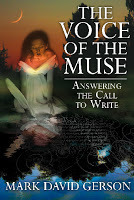 • You'll find additional tips and inspiration on my web site, where you can read my "Rules for Writing," sign up for my mailing list and read/hear free excerpts from The Voice of the Muse: Answering the Call to Write.
• You'll find additional tips and inspiration on my web site, where you can read my "Rules for Writing," sign up for my mailing list and read/hear free excerpts from The Voice of the Muse: Answering the Call to Write.
Buy The Voice of the Muse: Answering the Call to Write and The Voice of the Muse Companion: Guided Meditations for Writers from my online bookstore, and be sure to ask for a signed copy of the book. Both are also available on Amazon

Ever.
You don't have to sweat over the blank page. You don't have to chew your pencil (or fingernails) to the nub. You don't have to wonder where the next word is coming from.
Writer's block is a myth -- not because you won't ever feel stuck but because there's no reason for you ever to stay stuck.
If the video doesn't appear above, or if you'd rather view it in HD, click here.
(If you're on my mailing list and seeing this in an email, click the image above, which links to my blog and the "The Myth of Writer's Block" video.)
• For more videos about writing and the creative process, visit my YouTube page.
 • You'll find additional tips and inspiration on my web site, where you can read my "Rules for Writing," sign up for my mailing list and read/hear free excerpts from The Voice of the Muse: Answering the Call to Write.
• You'll find additional tips and inspiration on my web site, where you can read my "Rules for Writing," sign up for my mailing list and read/hear free excerpts from The Voice of the Muse: Answering the Call to Write.Buy The Voice of the Muse: Answering the Call to Write and The Voice of the Muse Companion: Guided Meditations for Writers from my online bookstore, and be sure to ask for a signed copy of the book. Both are also available on Amazon

Published on January 23, 2011 19:22
Resistance is Futile, or How to Unstick When You're Stuck
Writer's block is nothing more nor less than your resistance to those words that would have their way with you if you would but surrender to them.
 Instead, you say, "No, not these words. I want others."
Instead, you say, "No, not these words. I want others."
Well, there are no other words. There are only heart words.
If you would but open your heart and allow what longs to flow from you easy egress, there would be no block. If you would but make your fear subservient to your courage, there would be no block. For fear and courage can coexist, but not as equals. One must take precedence. Fear leads to inaction. Courage to action.
 Step through your fear and into your courage. Write through your fear and into your courage. Allow the voice of your Muse to live through you onto the page.
Step through your fear and into your courage. Write through your fear and into your courage. Allow the voice of your Muse to live through you onto the page.
Do it now. Write. Surrender to the story, whatever it is. Dissolve your resistance. And let those words you have run from have their way with you. Now.
• More on writer's block.
Adapted from The Voice of the Muse: Answering the Call to Write, from the "Myth of Writer's Block" section.
 Instead, you say, "No, not these words. I want others."
Instead, you say, "No, not these words. I want others."Well, there are no other words. There are only heart words.
If you would but open your heart and allow what longs to flow from you easy egress, there would be no block. If you would but make your fear subservient to your courage, there would be no block. For fear and courage can coexist, but not as equals. One must take precedence. Fear leads to inaction. Courage to action.
 Step through your fear and into your courage. Write through your fear and into your courage. Allow the voice of your Muse to live through you onto the page.
Step through your fear and into your courage. Write through your fear and into your courage. Allow the voice of your Muse to live through you onto the page. Do it now. Write. Surrender to the story, whatever it is. Dissolve your resistance. And let those words you have run from have their way with you. Now.
• More on writer's block.
Adapted from The Voice of the Muse: Answering the Call to Write, from the "Myth of Writer's Block" section.
Published on January 23, 2011 19:11
January 20, 2011
What Makes a Good Writer? (Video)
How do you define a "good writer"? It's a question I'm often asked in interviews and by coaching clients, and there are probably as many definitions as there are definers.
Is being a good writer about your content? About your process? Or is it about surrendering to the Muse Stream and letting your story have its way with you? Watch the video below for my answer.
Click here if the video doesn't appear above.
(If you're on my mailing list and seeing this in an email, click the image above, which links to my blog and the "What Makes a Good Writer" video.)
• For more videos about writing and the creative process, visit my YouTube page.
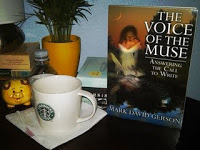 • You'll find additional tips and inspiration on my web site, where you can read my "Rules for Writing," sign up for my mailing list and read/hear free excerpts from The Voice of the Muse: Answering the Call to Write.
• You'll find additional tips and inspiration on my web site, where you can read my "Rules for Writing," sign up for my mailing list and read/hear free excerpts from The Voice of the Muse: Answering the Call to Write.
Buy The Voice of the Muse: Answering the Call to Write and The Voice of the Muse Companion: Guided Meditations for Writers from my online bookstore, and be sure to ask for a signed copy of the book. Both are also available on Amazon

Is being a good writer about your content? About your process? Or is it about surrendering to the Muse Stream and letting your story have its way with you? Watch the video below for my answer.
Click here if the video doesn't appear above.
(If you're on my mailing list and seeing this in an email, click the image above, which links to my blog and the "What Makes a Good Writer" video.)
• For more videos about writing and the creative process, visit my YouTube page.
 • You'll find additional tips and inspiration on my web site, where you can read my "Rules for Writing," sign up for my mailing list and read/hear free excerpts from The Voice of the Muse: Answering the Call to Write.
• You'll find additional tips and inspiration on my web site, where you can read my "Rules for Writing," sign up for my mailing list and read/hear free excerpts from The Voice of the Muse: Answering the Call to Write.Buy The Voice of the Muse: Answering the Call to Write and The Voice of the Muse Companion: Guided Meditations for Writers from my online bookstore, and be sure to ask for a signed copy of the book. Both are also available on Amazon

Published on January 20, 2011 19:48
What Makes a Good Writer?
How do you define a "good writer"? It's a question I'm often asked in interviews and by coaching clients, and there are probably as many definitions as there are definers.
Is being a good writer about your content? About your process? Or is it about surrendering to the Muse Stream and letting your story have its way with you? Watch the video below for my answer.
Click here if the video doesn't appear above.
(If you're on my mailing list and seeing this in an email, click the image above, which links to my blog and the "What Makes a Good Writer" video.)
• For more videos about writing and the creative process, visit my YouTube page.
 • You'll find additional tips and inspiration on my web site, where you can read my "Rules for Writing," sign up for my mailing list and read/hear free excerpts from The Voice of the Muse: Answering the Call to Write.
• You'll find additional tips and inspiration on my web site, where you can read my "Rules for Writing," sign up for my mailing list and read/hear free excerpts from The Voice of the Muse: Answering the Call to Write.
Buy The Voice of the Muse: Answering the Call to Write and The Voice of the Muse Companion: Guided Meditations for Writers from my online bookstore, and be sure to ask for a signed copy of the book. Both are also available on Amazon

Is being a good writer about your content? About your process? Or is it about surrendering to the Muse Stream and letting your story have its way with you? Watch the video below for my answer.
Click here if the video doesn't appear above.
(If you're on my mailing list and seeing this in an email, click the image above, which links to my blog and the "What Makes a Good Writer" video.)
• For more videos about writing and the creative process, visit my YouTube page.
 • You'll find additional tips and inspiration on my web site, where you can read my "Rules for Writing," sign up for my mailing list and read/hear free excerpts from The Voice of the Muse: Answering the Call to Write.
• You'll find additional tips and inspiration on my web site, where you can read my "Rules for Writing," sign up for my mailing list and read/hear free excerpts from The Voice of the Muse: Answering the Call to Write.Buy The Voice of the Muse: Answering the Call to Write and The Voice of the Muse Companion: Guided Meditations for Writers from my online bookstore, and be sure to ask for a signed copy of the book. Both are also available on Amazon

Published on January 20, 2011 19:48
January 12, 2011
Casting Six Add'l Roles for "MoonQuest" Movie Trailers
 Anvil Springs Entertainment still has a few more roles to cast for three feature-film trailers: for The MoonQuest and each of its two sequels, The StarQuest and The SunQuest.
Anvil Springs Entertainment still has a few more roles to cast for three feature-film trailers: for The MoonQuest and each of its two sequels, The StarQuest and The SunQuest. When completed, the three feature films will comprise Mark David Gerson's Q'ntana Trilogy.
*** SEEKING THE FOLLOWING:
• Male: Age 18-25, someone charismatic and who has great oratory skills.
• Male: Age 18-25, young for his age; fearful and immature at the start, he grows and matures into a leader.
• Male: Age 50+
• Female: Age 50+, carries herself with the bearing and presence of leadership.
• Female: Ethereal, timeless and translucent. Ethereal voice.
• Male/Female Infant: 3 to 12 months old
• Voice Over / Narration: Please email link to audio or attach an mp3 file
• Background/extras: Villagers and Soldiers, all ages and types
Please submit your headshot and resume to: casting@anvilspringsentertainment.com.
Auditions will be by appointment.
Submission deadline: Monday, January 17th, 2011
*** If you attended the previous casting call or have submitted via email, your information is on file. There is no need to resubmitl.
 (Anvil Springs is also accepting resumes for all film crew positions. Click here for details.)
(Anvil Springs is also accepting resumes for all film crew positions. Click here for details.)This is an action-packed, fantasy-themed trilogy: Think of The Chronicles of Narnia meets Lord of the Rings.
Filming will take place during two weekends in February.
This is a non-union, no-pay shoot. However, meals will be provided.
For info on Anvil Springs Entertainment visit anvilspringsentertainment.com. ("Like" us on Facebook.)
View this posting at filmnewmexico.
Published on January 12, 2011 15:24



